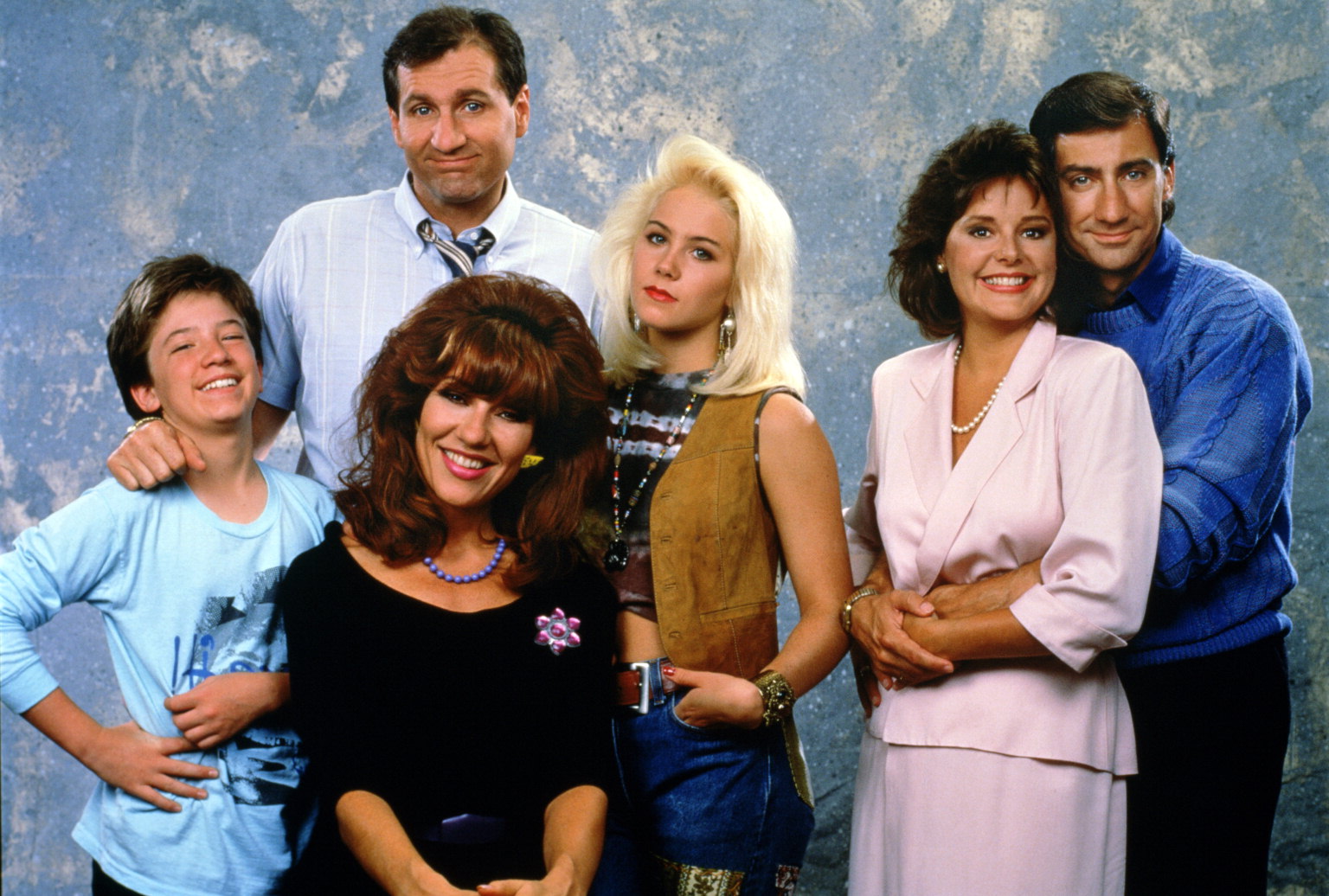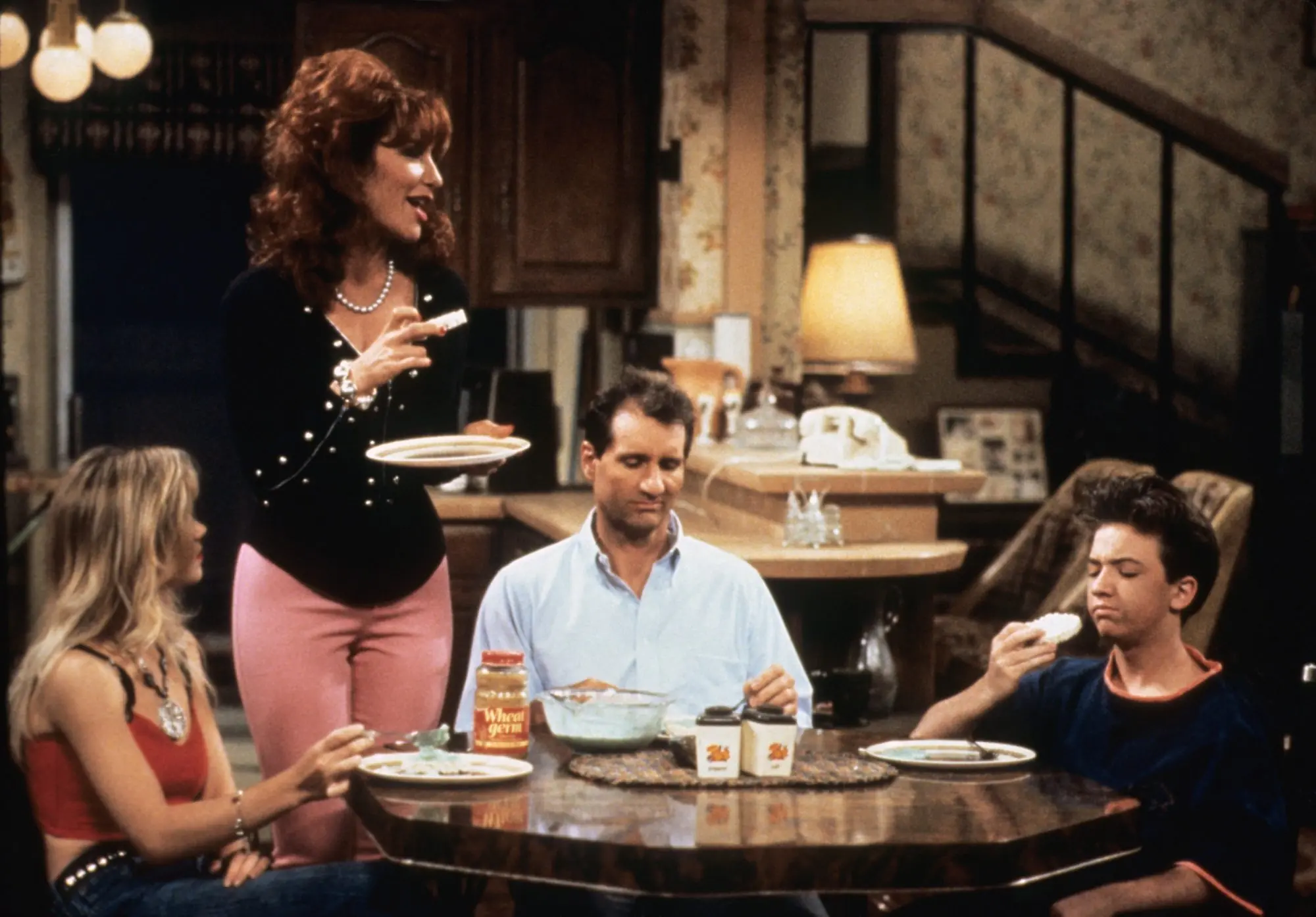MARRIED… WITH CHILDREN Decoded: Hail to Family Values

He hates his job, and the greatest luxury for him is the opportunity to have a warm meal and watch another episode of the show Father Psychopath in peace. Here is the world’s most popular shoe salesman.
In the pilot episode of Married… with Children, different actors played the roles of Al and Peggy’s children than the ones we saw on screen for several seasons. The producers experimented with the format and tried different ways to reach the audience. Initially, they also considered someone else for the role of Al Bundy – the grumpy “shoemaster” was to be played by popular American comedian Sam Kinison. However, they ultimately chose the brilliant duo of Ed O’Neill and Katey Sagal. This decision turned out to be a stroke of genius. The sitcom was warmly received, eventually becoming the longest-running comedy series in the world (a record that was later broken by Polish The Lousy World, which was modeled on the American format).

Al Bundy is the complete antithesis of the “American Dream.” He never achieved his dreams, and the only success he ever mentions at every opportunity is the four touchdowns he scored during a single game in a school tournament. The main character exaggerates this achievement to grotesque proportions. His eccentricity was more amusing than off-putting. Even the way Al tried to relax – lying on the couch with his hand halfway down his pants – sparked bursts of laughter.
However, credit must be given to Al for his deep knowledge of sports. But, as is often the case with a total misfortune, there always seems to be an obstacle preventing him from earning a living with his expertise by participating in TV and radio game shows. Al’s unfulfilled sports aspirations mirror those of O’Neill himself, who seriously considered a career as a football player in his youth. His plans were ultimately derailed by an injury. Before becoming known as a brilliant actor, O’Neill worked for many years as a teacher.

One of Al’s most characteristic traits is his arrogant attitude toward his family. He constantly mocks his wife’s laziness, his son’s problems with women, and his daughter’s stupidity. Beneath this facade, however, lies a loving husband and father who, whenever the opportunity arises, shows that he is willing to make the greatest sacrifices for his loved ones. This is particularly evident in episodes where Kelly becomes involved with rich men. Despite his initial enthusiasm regarding the potential financial benefits, he always prioritizes his daughter’s well-being. When it turns out that one of Kelly’s suitors has no intention of giving up other women, Al delivers a grand (though not without a hefty dose of irony) speech about the institution of marriage:
No respect for the holy torture called marriage. Let me tell you something. Maybe we Bundys have flaws, but we believe marriage is eternal, and no matter how disgusting the wake-up call is, every day with the same terrifying face, a vow is a vow. So anyone who can’t stand a clucking, chocolate-eating baby should stay away from the sexless kitchen.
In another episode, Al participates in a football game against the devil’s team. Just before catching the winning ball, the opponent freezes time, offering him millions of dollars and a harem of beautiful women if he gives up the victory. Al resists the temptation and catches the ball, ensuring his family’s freedom in the process.

Al has much bigger problems with accepting his job and the people who are doing better than him. He responds to the lack of respect from his boss and the irritating customers with mockery, which serves as a kind of defense mechanism. In almost every episode, he entertains the family—much to the audience’s applause—with stories about grotesquely overweight women who, annoyingly, always want to buy shoes that are several sizes too small. However, in this case, Al isn’t entirely consistent. His views on “fat women” change drastically when an opportunity to make money off of advertising with them arises.
Still, he doesn’t particularly care about complaints from female customers—he believes he is irreplaceable because no one else would agree to work for the same wages. Although his salary is never specifically mentioned in the series, in one episode, we find out that he earns less than a Pakistani cattle herder. Of course, this is just a humorous device, which seems exaggerated. For a man who always has an empty fridge, he earns enough to afford a mortgage on a two-story house.

From the perspective of the residents of the Chicago neighborhood where the Bundy family lives, especially their neighbor Marcy, things look much worse. Marcy is completely different from Al, which makes her his main opponent. She is a successful businesswoman working for the American branch of the Japanese Kyoto Bank. She drives expensive foreign cars (which, for Al, who drives an old American Dodge, is a sign of lack of patriotism), and she also identifies as a staunch feminist. Marcy’s worldview provides Al with plenty of material for jokes. As the head of the “Anti-Women” club and a regular at strip clubs, he even believes that Marcy isn’t really a woman. He dismisses his neighbor’s arguments as mere clucking, and in almost every confrontation, he compares her to poultry. He is able to establish much better contact with the men she dates, who—falling under Al’s charisma—often end up upsetting Marcy, who values her independence.
Ironically, it was Al Bundy’s authoritarian nature that won him immense sympathy from viewers worldwide. It seems that the arrogance of the character created by O’Neil made the audience appreciate any signs of his positive behaviors much more. That’s why Al could touch the audience with the simplest gestures. Because how can you not be moved when the hard-headed shoe salesman spends his last money on a Valentine’s Day gift for his wife or hugs his daughter, saying that he only wants the best for her?

Contrary to appearances, Al had certain attributes with which a large part of the male audience could identify. He didn’t mince words, yet he knew that actions speak much louder than verbal declarations of love. He also focused on maintaining a healthy balance in a relationship. Al didn’t avoid sex with his wife because he didn’t find her attractive; instead, he sent a clear message to men: at some point in life, youthful desire fades, and the desire to split time between work, family, and friends takes over.
The Bundy family made it clear that there are no perfect families—every family has arguments, misunderstandings, and a certain amount of spitefulness. However, all of these differences disappear in critical moments when mutual support is needed. Married… with Children showed this, of course, in an absurd way, spiced with dark humor—anyone who wanted to hurt a family member was knocked out by the others. At first glance, it seemed like a glorification of violence, but in these exaggerated scenes, there was a very positive message: no matter how much you might argue with your family, they should be your highest priority.

